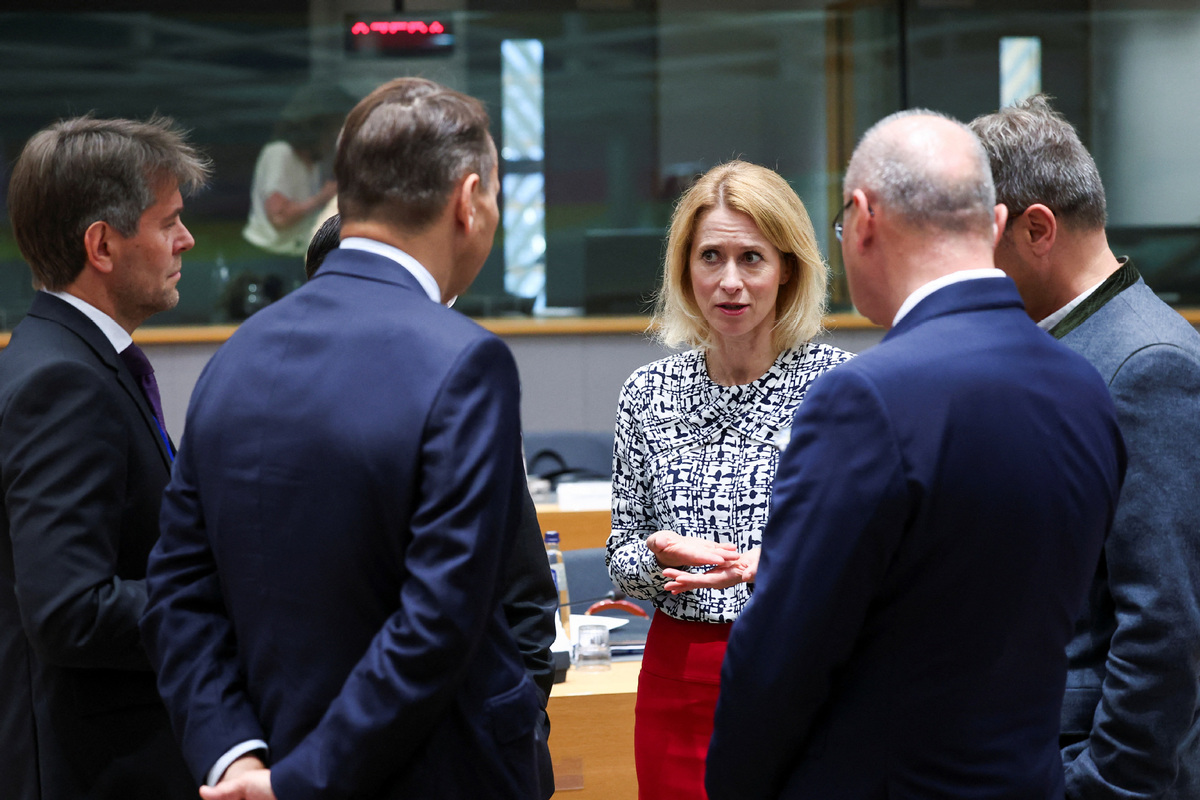
Although Kaja Kallas, the European Union's high representative for foreign affairs and security policy, attributed the bloc's failure to approve its 18th Russia-related sanctions package on Tuesday to Slovakia blocking it, citing energy concerns, she cannot deny that the member states no longer pin high hopes on ending the Ukraine crisis through sanctions.
Despite the EU imposing 17 rounds of sanctions on Russia so far, in addition to the relentless US sanctions on the country and its major trading partners, the odds on Kyiv winning a victory on the battleground have only become slimmer.
READ MORE: FT: Trump asks Zelensky if Ukraine could hit Moscow
Sanctions have never proved to be an effective way to end a conflict, because they are incapable of addressing the root cause of the conflict.
Since it is impossible to help Ukraine win the conflict through sanctions, the motivation for continuing to roll out new sanctions and other restrictive policies is evidently geopolitical purposes.
For instance, that some high-tech Chinese entities have found themselves in the crosshairs of Russia-related sanctions, particularly those imposed by the US, is because those sanctions are intended to thwart China's progress in relevant sectors.
After the visit to Washington early this week by NATO chief Mark Rutte, the US administration threatened to impose 100 percent tariffs on Russian goods and also "secondary sanctions" on countries buying Russian oil unless Russia agreed to a peace deal within the next 50 days.
US Senator Lindsey Graham has even raised the prospect of China and other countries being hit with 500 percent tariffs and other punitive measures if they continue trading with Russia.
Rutte also warned on Wednesday that countries such as Brazil, China and India could be hit very hard by "secondary sanctions" if they continue to do business with Russia.
Since the US is engaged in intensive talks with its trading partners, it seems likely that its latest tariff threat is a tactic for leverage in its trade talks with relevant economies.
But the US, the EU and North Atlantic Treaty Organization should be reminded that apart from the countries they target, Turkiye and Germany, both NATO member states, are also among the major trading partners of Russia.
It is also worth noting that collectively, with a total goods trade standing at 67.5 billion euros ($78.45 billion), the EU was still Russia's third-biggest trade partner last year, accounting for 38.4 percent of Russia's total trade in goods.
Russia remains the second-largest supplier of oil and gas to the EU after the US. And if the Russian-sourced oil and gas the EU bought from India, Turkiye and other third parties are taken into account, the EU's actual trade volume with Russia would be much larger.
It is no secret that some US companies are also taking advantage of the price ceiling the EU has put on Russian crude oil to buy cheap Russian oil through third parties and processing it in the US and other countries and then selling the oil back to the EU to exploit the price gap.
Not to mention the fat profit the US openly makes from selling expensive liquefied natural gas to the EU after the Nord Stream pipelines were mysteriously damaged at the beginning of the Ukraine crisis.
So, strictly speaking, the new sanctions the EU and the "secondary sanctions" the US threaten to impose on Russia and its trading partners should also target their own entities.
The mineral resource deal Ukraine was compelled to sign with the US, and the other NATO members' coerced agreement to raise defense spending from 2 percent of GDP to 5 percent to buy US weapons should prompt the EU to realize its self-created "security concern" is being exploited by Washington.
ALSO READ: China and the EU seek to build foundation on which to further deepen their relations
Kallas raised a very good point about the US' "support" for Ukraine after a meeting of EU foreign ministers in Brussels on Tuesday: "If you promise to give the weapons, but say that it's somebody else who is going to pay for it, it is not really given by you."
China's position on the Ukraine crisis is consistent and clear: It calls for dialogue between Russia and Ukraine, as negotiation is the only viable way out of the crisis. It firmly opposes any illicit unilateral sanctions and long-arm jurisdiction, as coercion and pressure will not resolve the crisis.
Both the US and the EU should help create the atmosphere and conditions for a political settlement of the Ukraine crisis, and act in ways conducive to promoting talks for peace.
Rather than targeting China with their Russia-related sanctions, they should work with China and other pro-peace partners, including Brazil, to support efforts to realize a peaceful resolution of the crisis.


